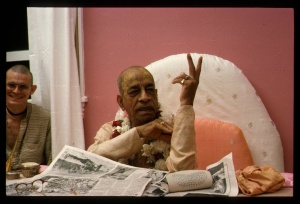SB 3.2.3

A.C. Bhaktivedanta Swami Prabhupada
TEXT 3
- sa kathaṁ sevayā tasya
- kālena jarasaṁ gataḥ
- pṛṣṭo vārtāṁ pratibrūyād
- bhartuḥ pādāv anusmaran
SYNONYMS
saḥ — Uddhava; katham — how; sevayā — by such service; tasya — his; kālena — in course of time; jarasam — invalidity; gataḥ — undergone; pṛṣṭaḥ — asked for; vārtām — message; pratibrūyāt — just to reply; bhartuḥ — of the Lord; pādau — His lotus feet; anusmaran — remembering.
TRANSLATION
Uddhava thus served the Lord continually from childhood, and in his old age that attitude of service never slackened. As soon as he was asked about the message of the Lord, he at once remembered all about Him.
PURPORT
Transcendental service to the Lord is not mundane. The service attitude of the devotee gradually increases and never becomes slackened. Generally, in old age a person is allowed retirement from mundane service. But in the transcendental service of the Lord there is no retirement at all; on the contrary, the service attitude increases more and more with the progress of age. In the transcendental service there is no satiation, and therefore there is no retirement. Materially, when a man becomes tired by rendering service in his physical body, he is allowed retirement, but in the transcendental service there is no feeling of fatigue because it is spiritual service and is not on the bodily plane. Service on the bodily plane dwindles as the body grows older, but the spirit is never old, and therefore on the spiritual plane the service is never tiresome.
Uddhava undoubtedly became old, but that does not mean that his spirit became old. His service attitude matured on the transcendental plane, and therefore as soon as he was questioned by Vidura about Lord Kṛṣṇa, he at once remembered his Lord by reference to the context and forgot himself on the physical plane. That is the sign of pure devotional service to the Lord, as will be explained later on (lakṣaṇaṁ bhakti-yogasya, etc.) in Lord Kapila's instructions to His mother, Devahūti.